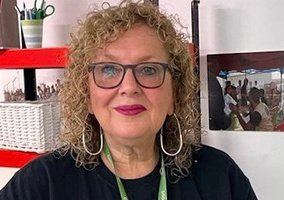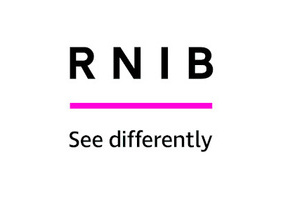Joining the charity sector as RNIB chief executive while it was being investigated by the Charity Commission was a “sticky” situation, says Matt Stringer, but not one with which he was completely unfamiliar.
“That was a very familiar landscape actually, as working in retail hasn’t been easy for the last ten years, there’s been a lot of change happening in the commercial space.”
Stringer joined the sight loss charity in 2019 after more than 30 years working in retail at companies including Marks and Spencer, Carphone Warehouse and Mothercare. At the time he started at RNIB, the charity was being investigated over governance failures that the regulator found had harmed young people.
He took over from former chief executive Sally Harvey, who had left the charity shortly after the inquiry began.
His first couple of years in tenure involved dealing with the outcome of the inquiry. Stringer and the team at RNIB reviewed its governance and financial controls.
“There was a lot of introspective work we had to fix and that felt very safe, very normal [for me],” Stringer says.
When asked what he was most proud of achieving at RNIB so far, he says getting out of that “sticky period”.
“Getting out of statutory inquiry was not easy. It was a lot of work on a number of fronts, and pretty dogged work over a couple of years.
“I’m proud of the fact we saw that through over two years – with Covid not really helping. I’m pleased as I think we're an organisation that blind and partially sighted people now see in a positive light.”
He is pleased with the “rehabilitation” of the RNIB, both internally and through its external perception.
‘We have that nimbleness and agility now’
Stringer says he was glad to be given the opportunity to transition to working in the charity sector, which he feels is imbued with a “sense of purpose and mission”.
While navigating the troubles of the pandemic, the charity had to adapt to new ways of working.
He says: “Many charities would see it as a bit of a double-edged sword I think we were all holed up. Society was incredibly apprehensive at the start about how it was going to play out.”
The situation made it so RNIB had to “respond really quickly”, which Stringer says still benefits the charity today.
It made the charity understand the benefits of “speed, agility and responsiveness” he says, and the good of “getting on with stuff and making things happen”.
“We’ve kept that memory alive of what it was like through Covid to try and make sure we have that nimbleness and agility now things are more settled down.
“But society is still incredibly febrile at the moment. A challenging government and the health service under pressure, social care under pressure, inflation is at 10% as of today. It’s an unprecedented set of challenges. So, I think charities have to be as nimble and agile as they were through Covid because I don't think it goes away at all.”
An initiative that was borne through lockdown has stuck with RNIB despite the lifting of restrictions, Stringer says. He gives a weekly video update each week to charity staff. With there being six main offices for RNIB spread across the UK.
“I do a weekly video which is me just talking openly to the team, which seems to get out pretty well.”
He says the pandemic has made the charity focused on “communicating effectively” and ensuring staff are coming into the office with a purpose.
Stringer says the charity’s shift to more hybrid working has been hugely positive for the charity.
He gives the example of people having caring responsibilities and giving them the licence to be flexible in the times they work around their life.
“Giving people that licence and encouragement to make it work for them, as opposed to getting them to strap on their laptop and work in a regimented way. I think we’ve seen a lot of very positive responses back for the team, actually, for how we did support people through Covid.
“If people realise that you’re trying to do the right thing by them, they do give it back, so it works out for everybody.”
Recruiting people with sight loss
As a charity set up to support the blind and visually impaired (VI) people, it is important it represents the community it serves, Stringer says.
A requirement ensures at least one of the chair or chief executive must have lived experience of being blind or visually impaired. The chair of RNIB, Anna Tylor, has a visual impairment.
A minimum of 25% of the charity's trustees must have lived experience of sight loss.
In the financial year ending 2022, RNIB reported the amount of employees with a disability in leadership positions was 14.1%.
But finding VI people to fill senior positions at the charity can be a challenge, Stringer says.
“One of the challenges which we find is VI people haven’t had the opportunity to build careers to give them the experience to most easily then progress into senior roles.
“Part of what we’ve got to do is to put in place schemes to give people employment opportunities and participation opportunities of different levels.”
RNIB is working with the Thomas Pocklington Trust to provide 21 paid internships for blind and partially sighted people.
Stringer says during its recruitment for new trustees, the charity has found VI people that might not be ready to be trustees and offered the opportunity to join subcommittees to gain experience.
While this might “not benefit us in general”, Stringer says “down the line it’s giving people experience which will allow them to kick on to bigger roles and better roles in their career”.
Helping blind and partially sighted people into work
A lot of RNIB’s recent work has been about helping blind and VI people retain their jobs – around 600 people per year.
RNIB is asking organisations to become “visibility better employers” by aligning with its working practices. For example, it asks employers to ensure their recruitment practices do not produce unnecessary barriers for blind or VI people.
“Society has not been set up to give VI the people and other people with a disability as many chances as able-bodied people. I’m not saying anything different or controversial, we know that to be true,” Stringer says.
The charity has been working with Tesco, which has achieved its visibility better employer standard. Its work has helped 350 people who are blind or VI into employment.
But one of RNIB’s main aspirations over the next three years is to help thousands into work as opposed to hundreds.
According to RNIB’s research, only one in four people with sight loss of working age are in employment, but 11,000 people with visual impairments are seeking work in the UK.
‘The bubble will be here tomorrow’
RNIB provides wellbeing initiatives for its staff. When asked what he does to look after his mental health, Stringer says he steps away and encourages others to do the same.
“[Work’s] always going to be there. Whatever you need to do to just sort of blink and go decompartmentalise it and go somewhere else.
“The bubble will be here tomorrow. Don’t worry about it. We’ll get through it.”
Editor's note: This article has been edited to remove a statement that there is a statutory requirement that 19% of RNIB staff must be blind or partially sighted as this is not correct.
Related Articles











